In late 2019 I was invited to contribute a Listener’s Choice edition of the radio show Charity Shop Classics. I accepted with alacrity and the resulting 58 minutes (plus intro and jingles) is available here on Mixcloud (via Facebook, because WordPress’s Mixcloud embed code isn’t working).
Charity Shop Classics is broadcast on All FM, a community radio station Manchester. Thanks to the magic of internet radio and Twitter CSC has a reach far beyond their Levenshulme base. All FM won the national Comunity Radio Station of the year award for 2019/20, and was praised for being ” possibly the most inclusive, diverse station I have ever heard and is a wonderful example of what Community Radio should be”. As I’m based in Leeds you might wonder if I’m really allowed on, but the Listener’s Choice slot was invented to widen the scope of the presenters and get records out of chazzas from all over the country onto the programme.
The show was an interesting challenge for me because I had to limit myself only to BBC Records found in charity shops. In theory that would be easy, as I do buy a lot of BBC discs in those place, but in practice, I had to exclude a lot more records from my collection than I first thought – those from second-hand shops and eBay make up the bulk, it seems. I was very strict with myself and didn’t cheat in what I selected, even though, for reasons of quality, I didn’t always play the track from the same disc that I’d bought charitably. I also wanted to show the breadth of material available on BBC Records and be entertaining in the selection and programming, so I had to pass over a lot of the charitable purchases. I have plenty of ball-room dancing records and language LPs from BBC Publications which weren’t what was needed at all either. Then there was the stuff that just isn’t suitable for broadcast at 11 AM on a Sunday. Lots of the comedy records are just too bawdy and adult for the slot. Even those you would think would be fine! Happily, I have been sent a quite few absolute gems found in charity shops by my pals on Twitter so once I’d reviewed the pile of possible stuff and made some decisions about what I wanted to showcase I was ready to record.
I haven’t been on the radio since student days, and that was as a duo, so it was quite daunting to have to speak into a microphone and ‘carry’ the whole thing. I’m not shy, but when you know every syllable has to be right and it’s all going to kept and played over and again it’s all very uncomfortable, to begin with. What even is my voice on the radio supposed to be, anyway? In the end, I decided on a quite loose script and accept the umms, errs and slip-ups and try and sound as natural as you can when talking to yourself in an attic. I got better as I did more, but you can probably spot the joins.
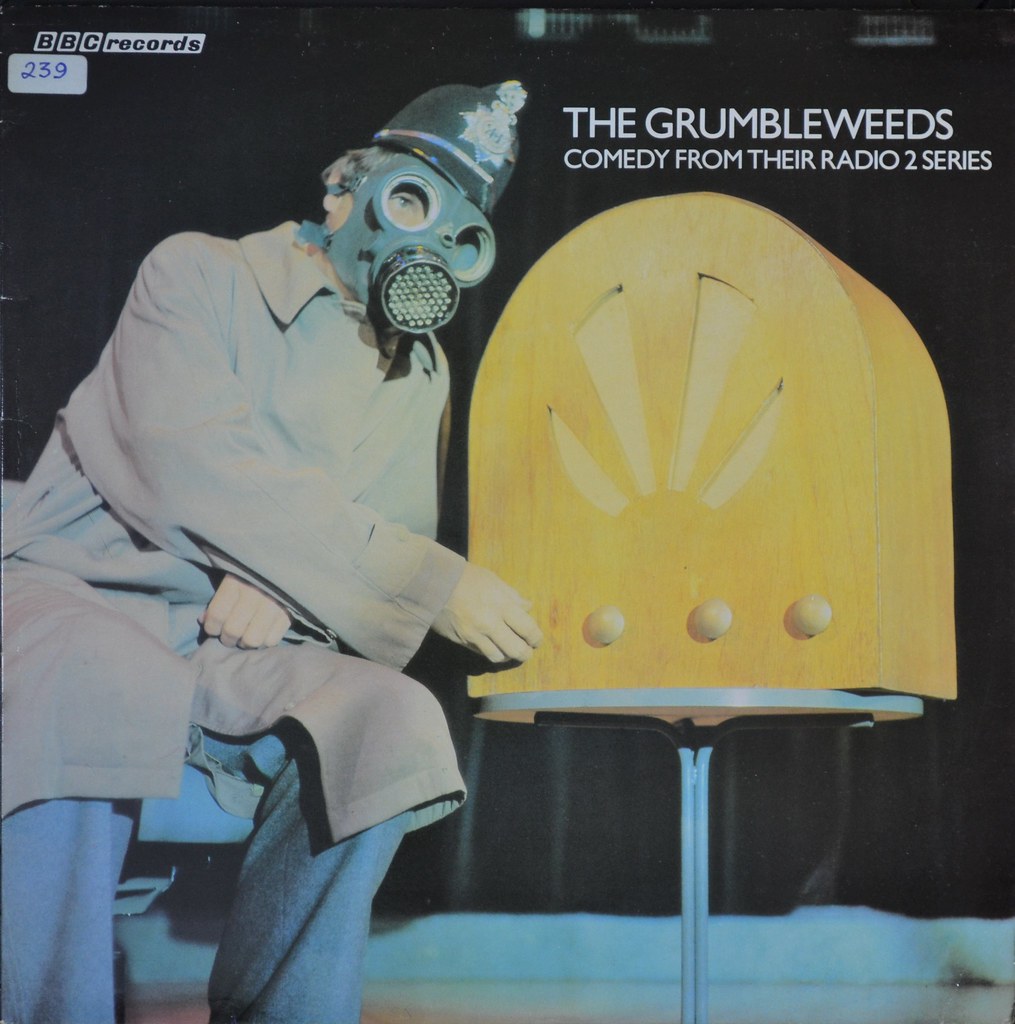
The selection of tracks is a deliberately wide-ranging mix of almost over-familiar and totally obscure. I chose to embrace the obvious big-sellers because that’s what you do find in charity shops, as well as the crate-digger delights which only turn up on when your luck is well and truly in. I was also keen to use some of the odder bric-a-brac to create interesting segues and a little more interest.
Trying to find the right amount to say and what to leave out was also a consideration. I could have talked for another hour about all the records, the programmes they came from and whatnot, as well as the story of BBC records, but I was content to leave that at a minimum and get more tracks in. But there’s always more to say, so here it is.
Contents
- Introduction: Breakfast Time Theme (Morning Dance)
- Boogie On Reggae Woman
- Quiller
- The Singing Detective
- Bakerloo Non-Stop
- Chi Mai
- Every Loser Wins
- Liberty Bell
- Modern Day ‘Pop’ Dancing
- Hi-Fidelity
- Bang On A Drum
- Gangsters
- Amor Dei
- Greenwich Chorus
- A Day In The Life of Radio 1
- I Saw The Light
- Sing A Soppy Song
- How To Stay Young
- For All We Know
- The Leg Over Into Deep Relaxation
Introduction: Breakfast Time Theme (Morning Dance)

Diana Moran from Get fit with the Green Goddess – REH 479 – 1983
You need to start strong, so I decided that if I was going to play this one it might as well come in as the introduction. I do like an unexpected theme and the Breakfast Time signature tune comes in right at the top. Not the original version though, no. This is played presumably by the Mike Towned and ‘The Green Goddess Band’. To be specific Trevor Bastow and/or David Firmin on “key-boards” (sic).
Then it’s a few firm words of warning from Diana Moran, The Green Goddess herself and she’s into the cat position.
Just a bit of silly to get things started and the intro has nothing to do with the show and everything to do with the joy of BBC Records.
Boogie On Reggae Woman

The Tony King Sounds from Music Through Midnight Presents – The Tony King Sound – REC 201 – 1975
No messing about now. Let’s tick off the selling points on this one. Funk; Synths; cover version you weren’t expecting; amazing sleeve art; Les Hurdle on bass; Music Though Midnight; Stevie Wonder; 1975.
Quiller

Denton & Cook from Quiller – RESL 25 – 1975
More funk and synths whilst we’re about it and this time the theme to the sunk without trace spy thriller Quiller staring Michael ‘The Valeyard/Peter Guillam (not in Smiley’s People though)’ Jayston. BBC Records gave Quiller a good push at the time, for them, but nothing much happened. I think you’ll agree it was worth a shove, but probably wasn’t really pop enough to chart well. The TV show fell flat and has never been seen of again but D&C would be back with a run of BBC Records & Tapes singles in 78/79 that bore more fruit.

My copy is pretty awful so I cheated a little and played the version on Hong Kong Beat
& Other BBC TV Themes (REH 385, 1980).
The Singing Detective

Max Harris & His Novelty Trio from The Singing Detective
Music from the BBC-TV serial written by Dennis Potter – REN 608 – 1986
Landmark mid-eighties Dennis Potter fever-dream mixed up narratives musical thriller hospital historical comedy-drama, with iconic Max Harris theme. Accordion heavy and gumshoe lightfooted, wistful and jazzy, late-night and smokey. Just a perfect theme. Harris had previous form with Porridge and Open All Hours as well as numerous less well known and less Ronnie Barker involved shows, such a ‘A Horseman Riding By’, which was released as a single by BBC Records & Tapes in 1978.
The Singing Detective soundtrack LP is a familiar, moustachioed, gun-toting, smoking, behatted face in charity shops and the sales were so good that another album of music tied to the series called The Other Side of The Singing Detective (REN 708) was issued. That was simply the flip-sides of all the discs used to make up the first.
Bakerloo Non-Stop
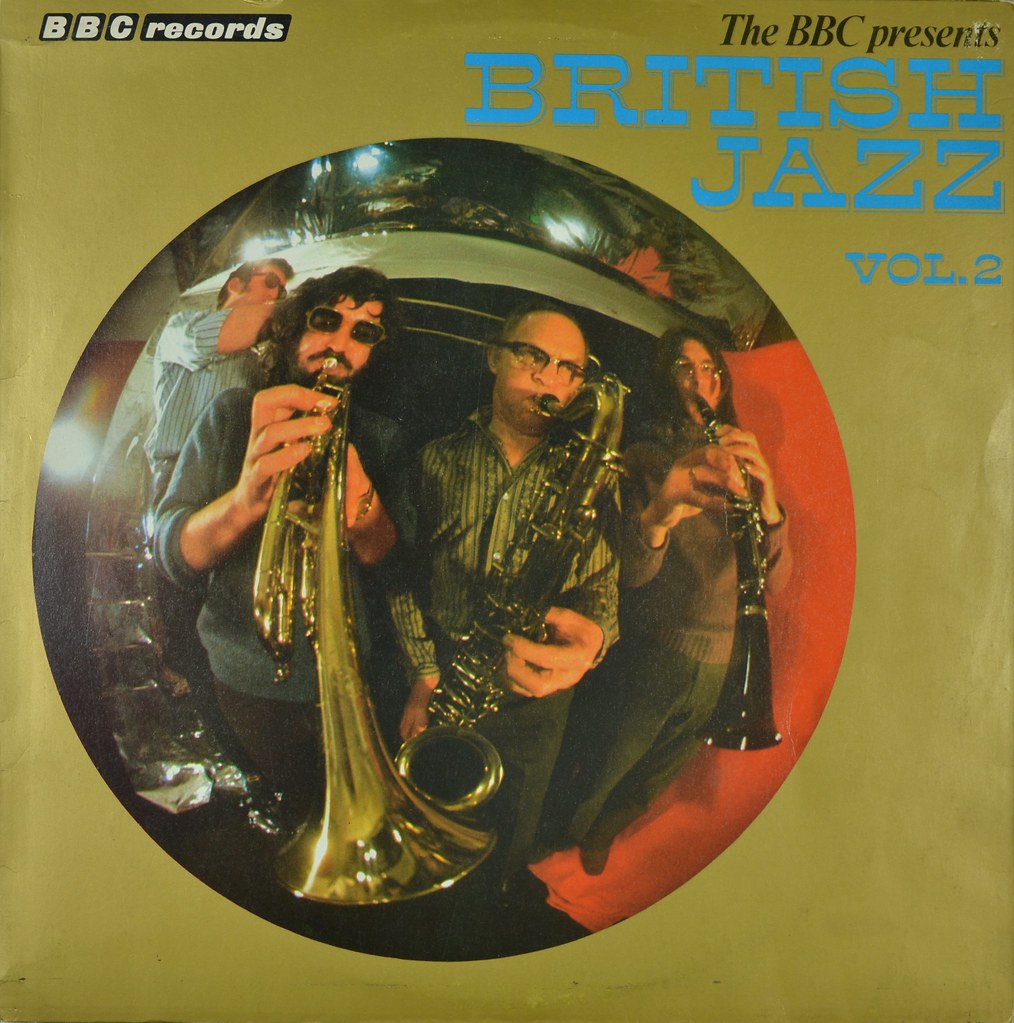
Ted Heath & His Sound from British Jazz Vol.2 – REC 144 – 1972
The oldest piece in the show by far, but somewhat appropriate to the era of the previous one. Heath was the great man of British Jazz in the post-war era and who picked up where Glenn Miller left off after his tour here. Bakerloo Non-Stop was written by Heath’s lead trumpeter, another giant of Britsh Jazz, Kenny Baker. A bit of a stomper, eh?
The album is one in a series of music selections (and The Goons) made for the ‘BBC Presents – 50 Years Of Broadcasting’ set of records. The distinctive golden sleeves with fish-eye lensed photos in the centre make an attractive set.
Chi Mai
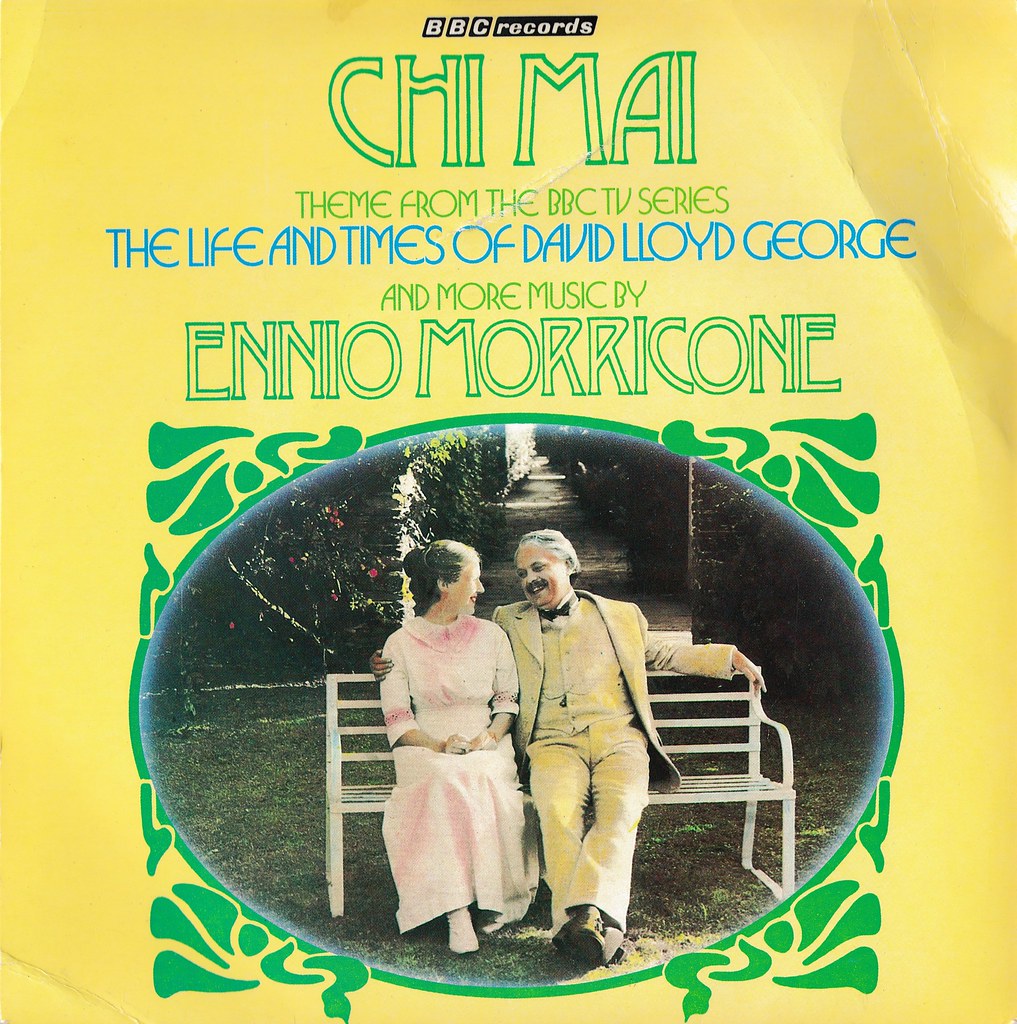
Ennio Morricone from Chi Mai – RELS 92 – 1981
The gran signore of Italian soundtracks with a reworked oldie flipped from B to A-side gets a near-miss at the top of the chart for BBC Records & Tapes in 1981.
The BBC’s use for Chi Mai was in the opening sequence to ‘The Life & Times of David Lloyd George’, which is largely forgotten now, but was a hefty BBC Wales drama production from 1981 relating the story of the last Liberal prime minister. That association was enough to drive massive sales of the single and it still turns up time and time again in charity shops.
Chi Mai seemed to be everywhere in 1981 (at least I have a very strong memory of it) and it was only held off the number one spot by Bucks Fizz with ‘Making Your Mind Up’ (a worthy opponent!). In the end it spent 10 weeks in the top forty and prompted a cumbersomely titled LP of music by Morricone. Chi Mai Theme From The BBC TV Series “The Life And Times Of David Lloyd George” and more music by Ennio Morricone (REH 414). The single was re-released in 1983 to coincide with the BBC One repeat run of the TV serial, to much less success, but a mark of how popular this tune was.
You know, I’d never really looked up what the original version of this was from, which is highly remiss of me – so here it is. The original of Chi Mai was written for the film Maddelana (1971), which is a saucy tale of temptation from Italy. The versions on this single were recorded for a single called ‘Disco 78’. That was released in France in (you guessed it) 1977, but the copyright note on the BBC issues is 1978. Confused? Well, I was till I looked all this up. Anyway, the disco part is on ‘Come Madellena’, which, logically enough, was the A-side to ‘Disco 78’ and the B-side to the BBC release.
Every Loser Wins
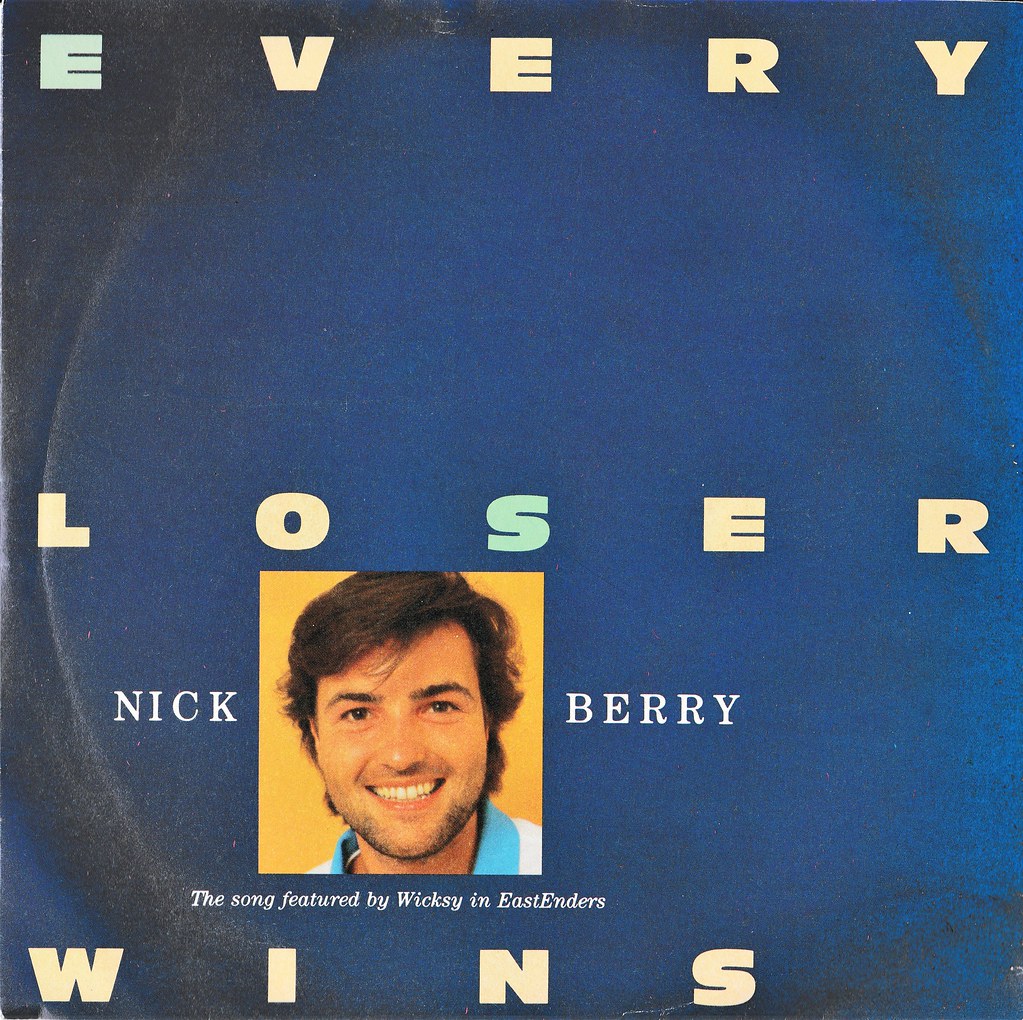
Nick Berry from Every Loser Wins – RESL 204 – 1986
It took BBC Records a decade to release their first hundred singles. Just five years after the chart smash of Chi Mai though they’d released another hundred! They had bothered the top-forty again in 1981 with ‘I Wanna Be A Winner’ by Brown Sauce from Swapshop, Orville’s Song reached number 4 in 1982 (in a tough Christmas market) Glenn Frey’s ‘Smuggler’s Blues’ from Miami Vice went top 30 in June 1985 too, but a lot went nowhere at all or scrapped the top 100. They threw a lot out but very little stuck. The LPs sales were better, as we’ll see, but singles were not big business.
1986 was the year though. The Grange Hill Cast’s ‘Just Say No’ got to number 5 in April, with 5 weeks in the top 40. Claire & Friends ‘ It’s ‘Orrible Being In Love (When You’re Eight and a Half), got to 13 and onto Top of the Pops too.
Then enter Simon May. The EastEnder’s theme hadn’t done much, peaking at 76 in March 1986, nor ‘Howard’s Way’ or ‘The Holiday Suite’, but this was just an overture. The very next release after Claire and Friends was the another run at Howard’s Way, but this time with lyrics! Marti Webb was the singer and again they were on TOTP and again at 13. Bang, the next release after that was the same trick with the ‘Stender’s theme. Angie Watts herself (Anita Dobson sang Don Black lyrics and TOTP were on the phone with two weeks at number four the prize. After a run of the usual so-so BBC fare, Eastenders kids pop band plot threw up another record (what are the chances!? written by Simon May? Get away!). Sharon Watts (Letitia Dean) and co-star Pal J Medford (who played Kelvin) scored a number 12 with ‘Something Outa Nothing’. BBC Records & Tapes were cool with the kids now. So, what next?
‘Every Loser Wins’ followed ‘Something Outa Nothing’ immediately in the catalogue and this time they were destined for the topper-most. Technically a spin-off from the previous release’s plot and not intended for the charts the song was played so often on EastEnders (thanks to Lofty’s breakdown cassette rewinding) that a single was hurried into the shops. Wicksy at the piano in the Vic was transported to Nick Berry (in a video) at the piano on TOTP and finally a number 1- for three weeks! They had to get extra pressing plants involved to cover the demand. Yes, it’s just a soppy ballad, I suppose, but if you were watching EastEnders and invested in the characters or even if you just thought Nick was a bit of a sort, it was catnip. It’s not that bad either, as ballads go.
Liberty Bell
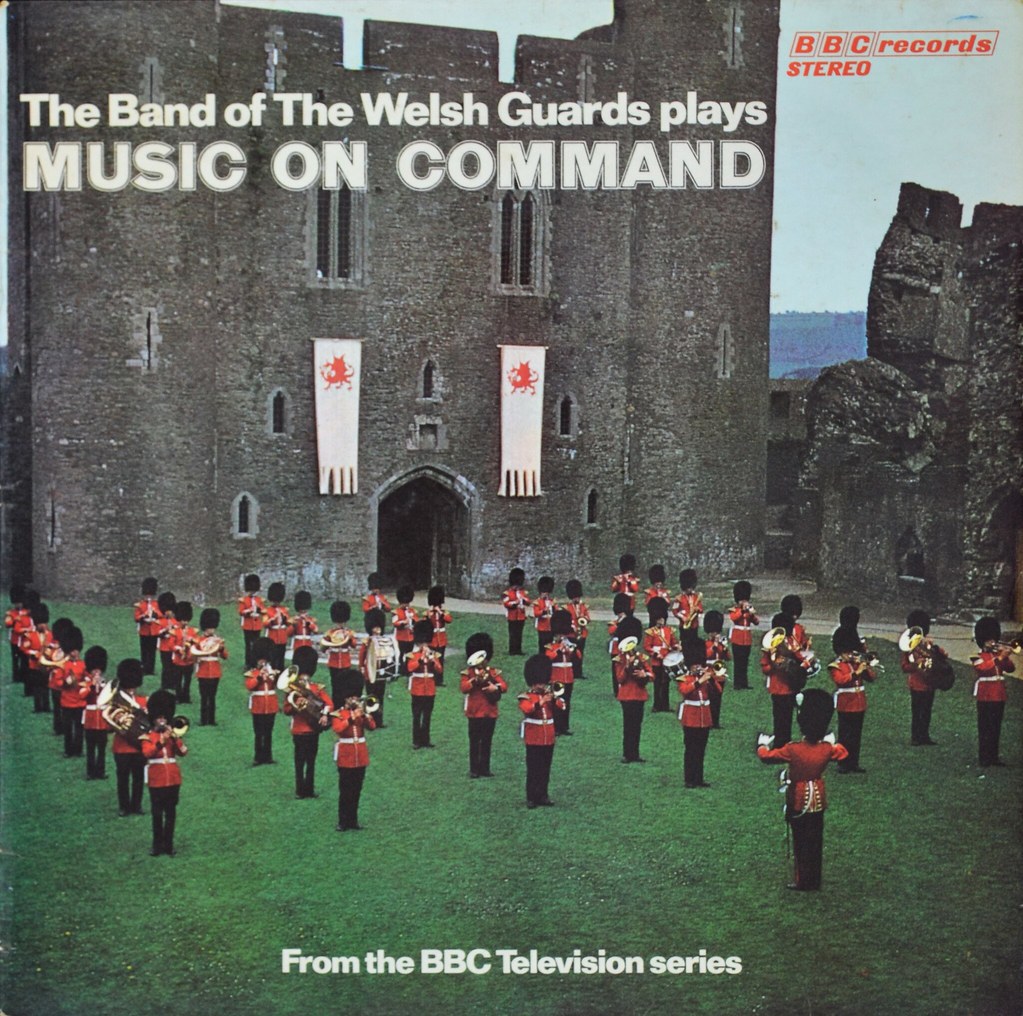
The Band of the Welsh Guards from Music On Command – REC 121 – 1971
Enough with the hits; lets get back to some bread and butter BBC Records; and it doesn’t get much more sustaining for the label than The Band of the Welsh Guards. Music on Command was their first LP for BBC Records and seven more were to follow, plus a couple of singles for good measure.
Liberty Bell is a quick march written by the marching band major domo John Philip Sousa from the US and a. It’s probably best known for being the theme tune to Monty Python’s Flying Circus where it was chosen for its total lack of association to the rest of the show and for being a cracking tune. That version was edited for levity and brevity, but worst of all it was a version recorded by the Welsh Guards arch-rivals (I mean, I assume they were…) the Grenadier Guards.
It was pure coincidence that although I was playing this track due to it’s familiarity from Monty Python it turned out to be broadcast in eth same week that Terry Jones passed away. So, it worked as a kind of tribute by mistake.
Modern Day ‘Pop’ Dancing
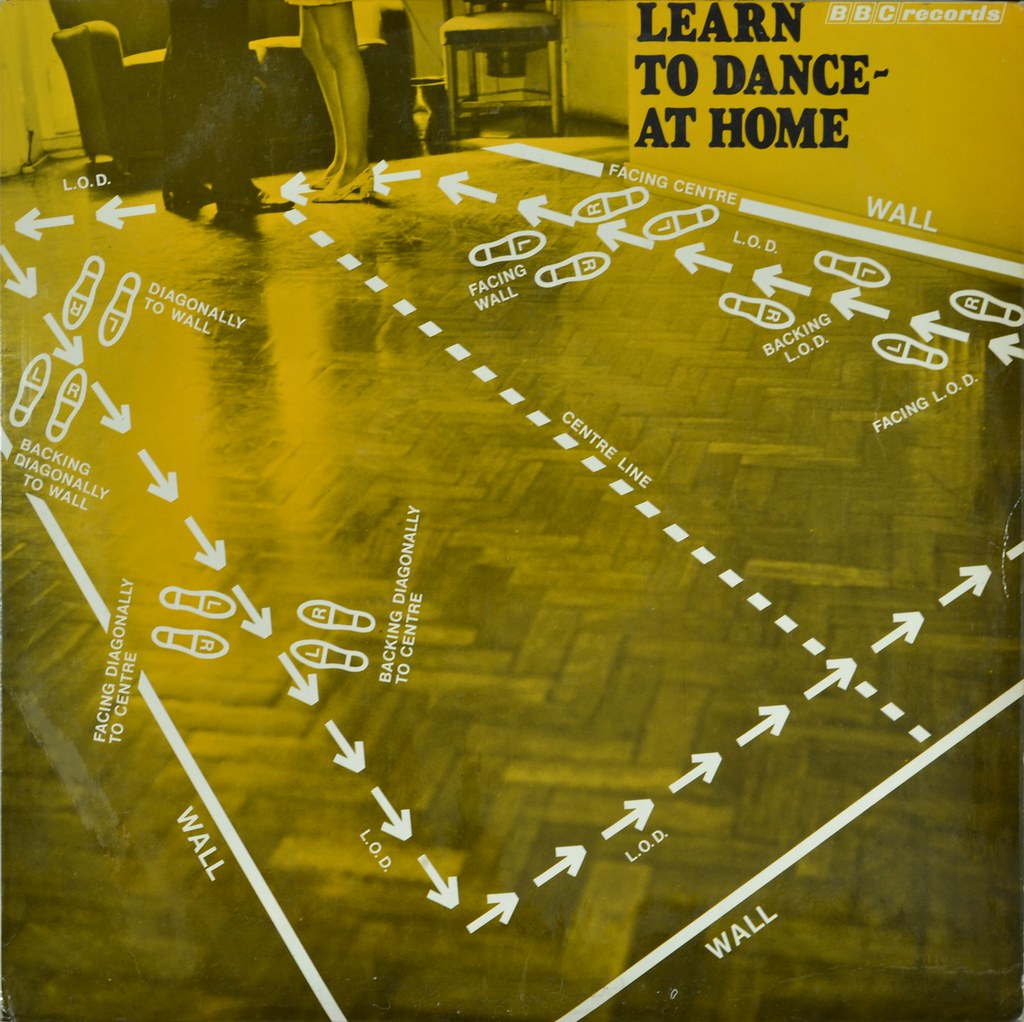
Jill Russell from Learn to Dance At Home – REC 92 – 1970
Ballroom dancing was another genre that BBC Records covered extensively but ‘Learn To Dance At Home’ was an early release, from 1970, and they didn’t return to it until 1977. This one is instructional, so let’s see what we can learn from Jill on the subject of ‘Pop’ dancing.
Hi-Fidelity
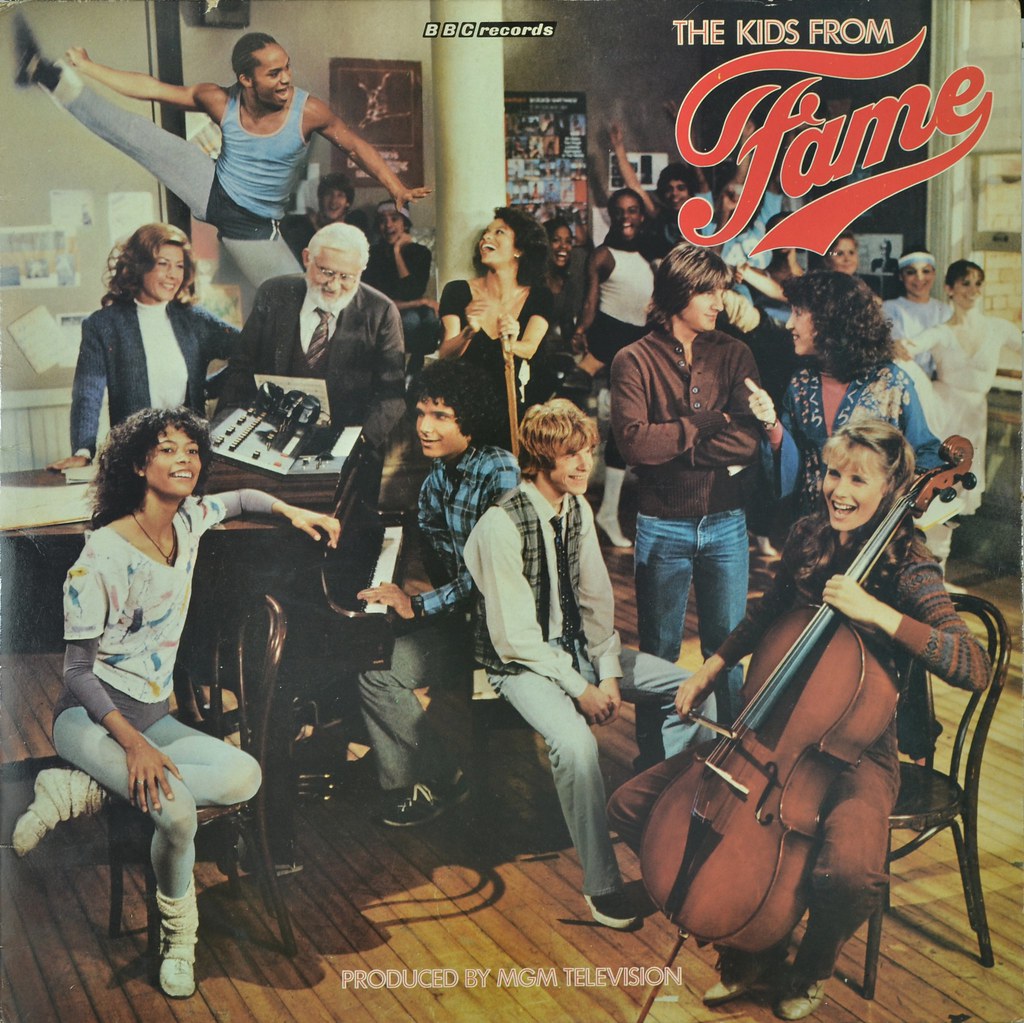
The Kids From Fame – REP 447 – 1982
I make no apology for going all-in on the most popular BBC Records & Tapes releases. These are the Charity Shop Classics. The Kids From Fame was a total monster selling record. Huge. Some chartity shops will have more than one of these, but most will have at least one. And if not, go back next week and they will. It’s ubiquitous.
Hi-Fidelity is from that episode where Bruno’s dad, the poor cab-driving father, broke one of Bruno’s synthesizers. Luckily not the $7000 one, but he still feels so bad that his son left another very expensive synth in pieces and powered on, inviting disaster, that he insists on buying him a newer, very expensive, Yamaha. Whilst in the shop trying out the new keyboard Bruno and classmate Doris instigate a performance which takes over the entire store. Yay!
Bang On A Drum
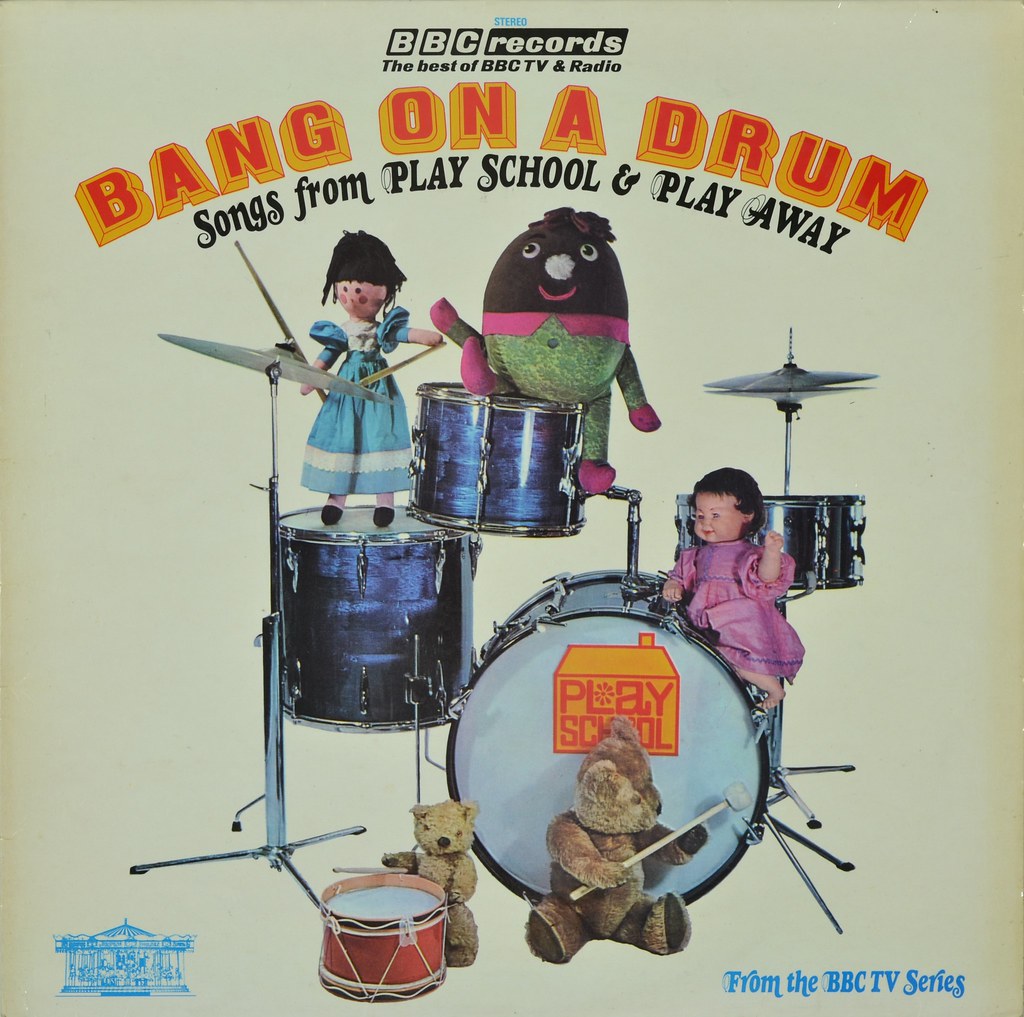
Rick Jones from Bang On A Drum
Songs from Play Scool and Play Away.From the BBC TV Series – RBT 17 – 1973
(Not the Todd Rundgren song, no, but we’ll be back to him later) I’m also unrepentant about playing more funk and this is fun-ky. Play School may be the backdrop and the simple fun of banging a beat out on whatever comes to hand the pre-school friendly notion, but this ditty is as funky as a mosquitoes’ tweeter. Coldcut got there early and sampled it for a bit of outro breakbeat fade on their ‘7-Minutes of Madness’ remix of ‘Paid In Full’ by Eric B & Rakim. The original song is, unfiltered, an absolute banger though! Rick’s gentle vocals, more folk than soul, the piano riffing and that beat, all perfection. I’m surprised no-one’s covered it, but could it really benefit from being any other way?
The LP was issued originally on the offshoot Roundabout label. This was BBC Records’ home for children’s releases in the early seventies, but for some reason, they started putting out Easy Listening on it and the after-dinner gentlemen’s chit-chat of ‘The Many Voices of Peter Ustinov’. Playtime for grown-ups. And then Roundabout was gone. Like someone suddenly found out that the drunks were mucking about in the fairground after hours and closed it completely. Which was all a bit strange.
Gangsters
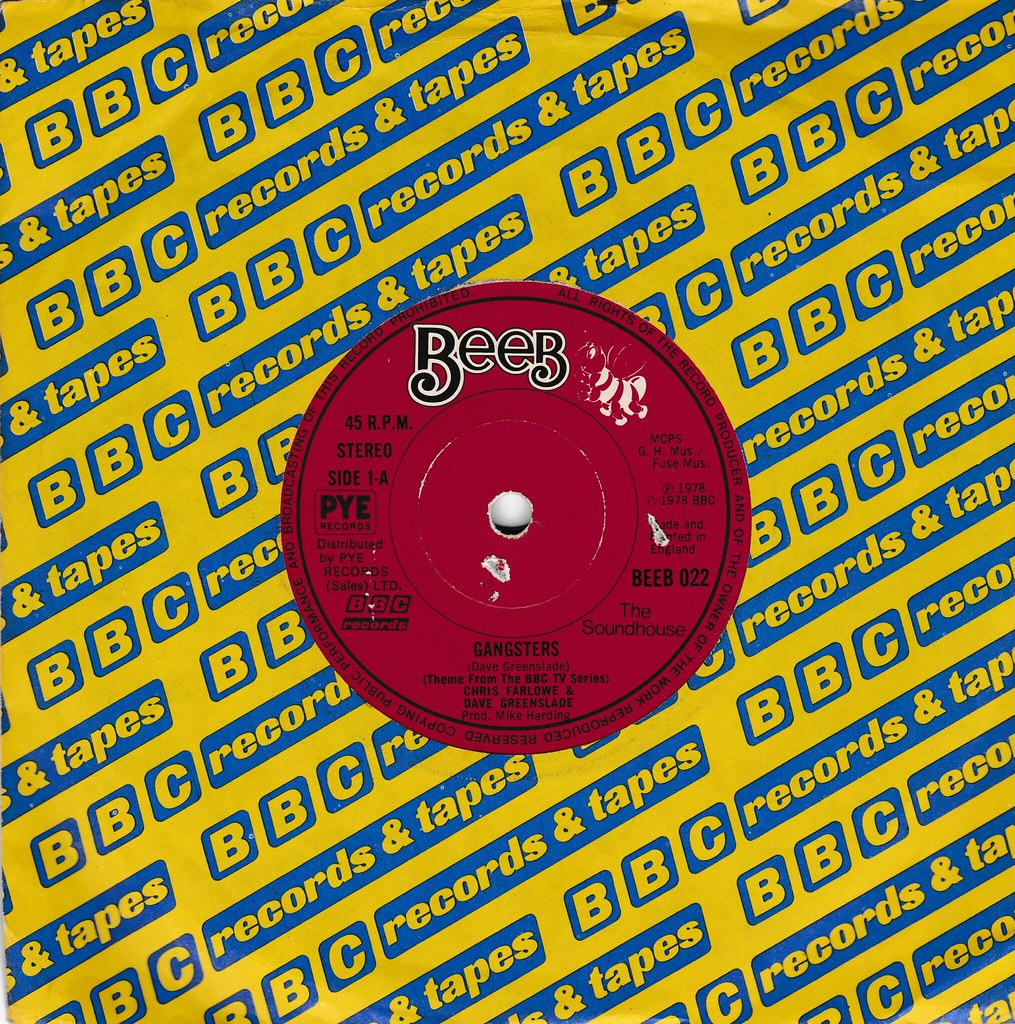
Chris Farlowe & Dave Greenslade from Gangsters – Beeb 022 – 1978
Speaking of odd: Gangsters. Birmingham set crime-drama which at the end devolved into fourth-wall-breaking capering about, which had this jazz-prog-funk affair as its theme. Chris Farlowe made his name with the number one ‘Out Of Time’ in 1966 but here we are, 12 years later with a performance that’s impossible to categorise. Is it male or female? Dave Greenslade packs a lot into the backing track and is no less eccentric including a bit of talkbox scatting for the heck of it.
Beeb was a pop music sub-label of the main catalogue which also put out albums on Super Beeb.
Amor Dei
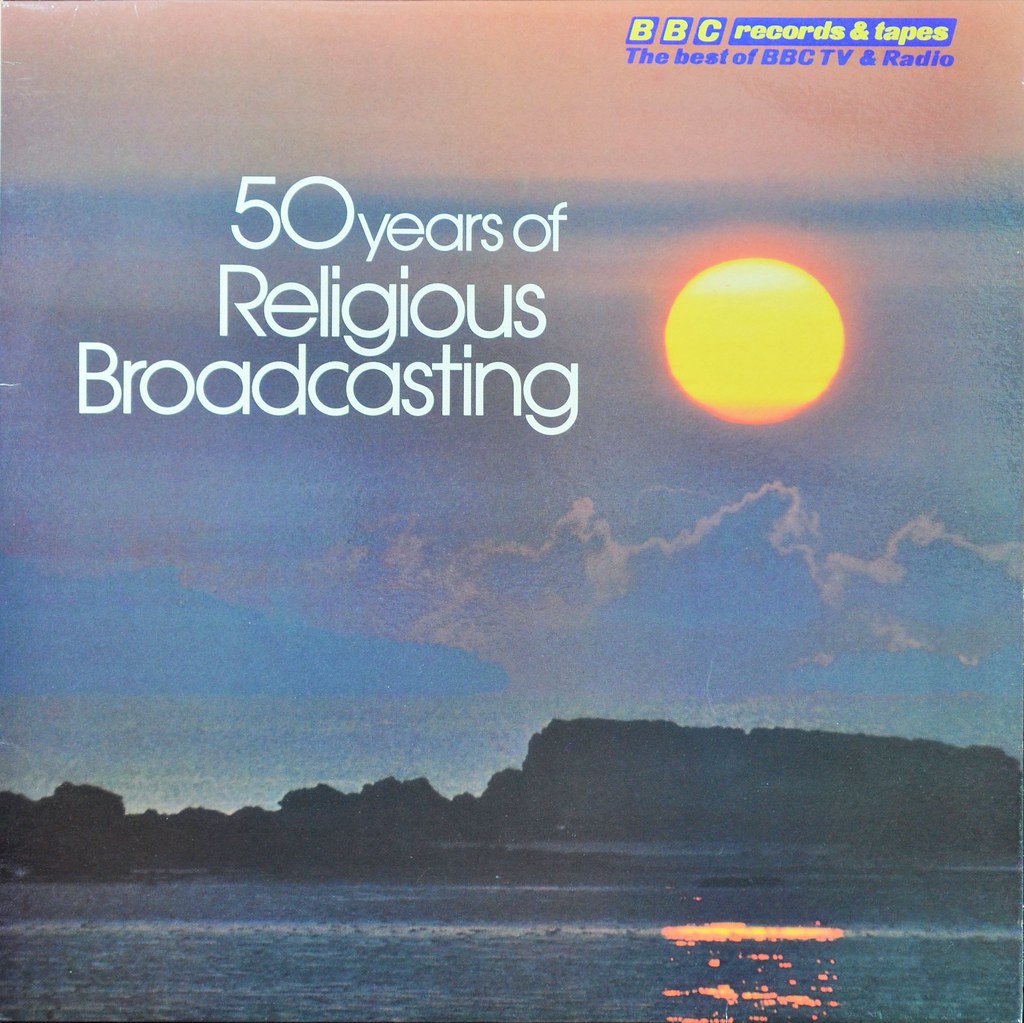
Delia Derbyshire & Barry Bermange from 50 Years of Religious Broadcasting – REC 184 – 1974
Few artists on BBC Records releases are as fascinating as Delia Derbyshire. She was a genius with sound and found her home at the BBC Radiophonic Workshop where her facility with maths and music gave her the tools to take the craft of electronic music up a level or two. Doctor Who (1963) is her monument, but she was to go on exploring and expanding possibilities for the BBC on TV and radio for another ten years.
Amor Dei is part of a set of four ‘Inventions for Radio’ which Derbyshire collaborated on with Bermange. The love of God is relatively light compared to the spooky The Dreams, which is really quite unsettling. Still, they all stand apart compared to almost anything else you have ever heard.
I chose this one because it’s so extraordinary and such a favourite of mine, but also because I just happened to have found it in a charity shop and its religious subject matter made it ideal for a Sunday morning broadcast.
The rest of ’50 Years of Religious Broadcasting’ is probably only of interest to religious scholars or the supremely devout, but this excerpt of experimental inventiveness makes it well worth owning because it’s the only official release of any of the ‘Inventions’.
Greenwich Chorus
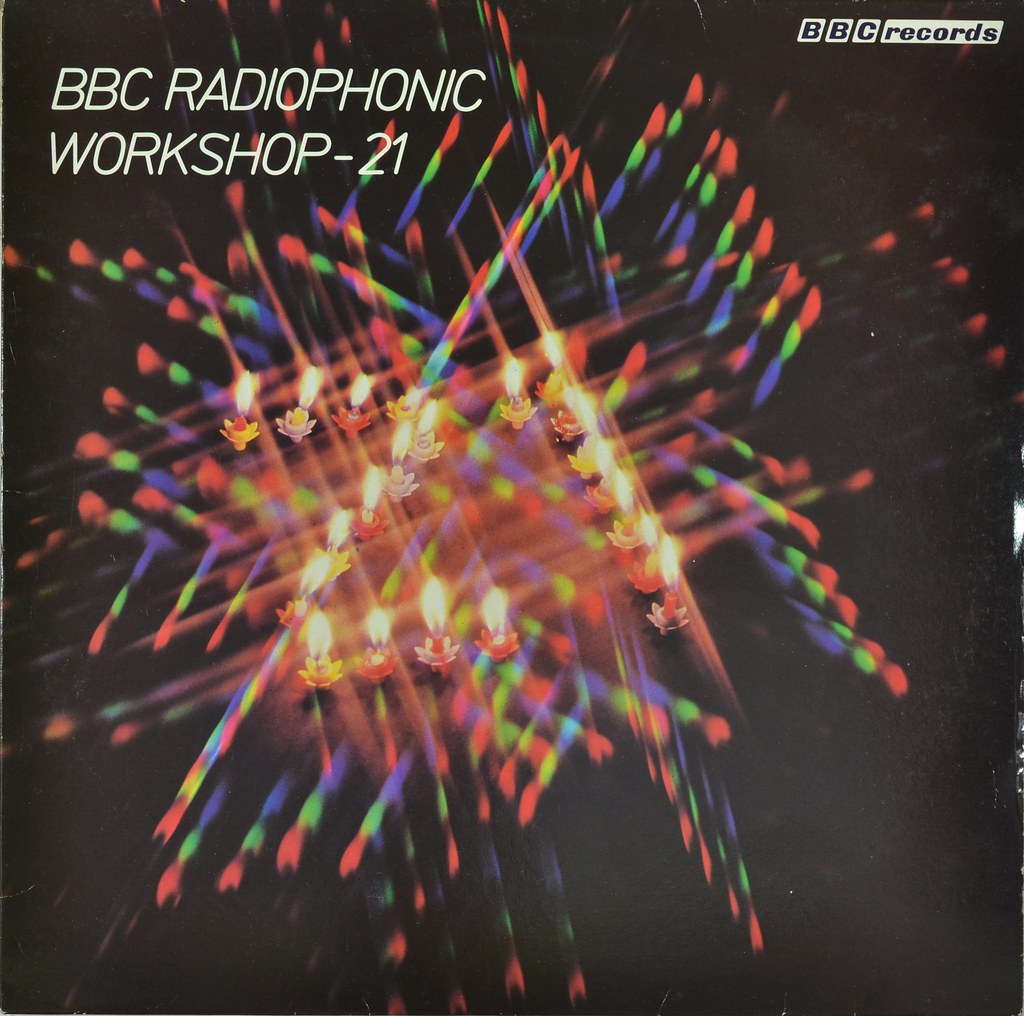
Peter Howell from BBC Radiophonic Workshop – 21 – REC 354 – 1979
Dr Jonathan Miller’s landmark documentary about life, medicine and well, the body complete with an actual autopsy, was scored entirely by Peter Howell of the Radiophonic Music Factory, sorry, Workshop. By the late seventies the tape and, err, sticky tape, techniques of the sixties had been largely replaced by the kind of synthesizers that Bruno Martelli would be proud to have his dad pay thousands of dollars for. In this case, Howell had to hire a Yamaha CS-80, but did such a bang-up job he shamed the BBC into buying one for the Workshop.
Greenwich Chorus was written as the soundtrack to a section about clocks and features the vocoder with Howell’s wordless vocalisations making the chorale. Switchboards were jammed and a single was released in response.
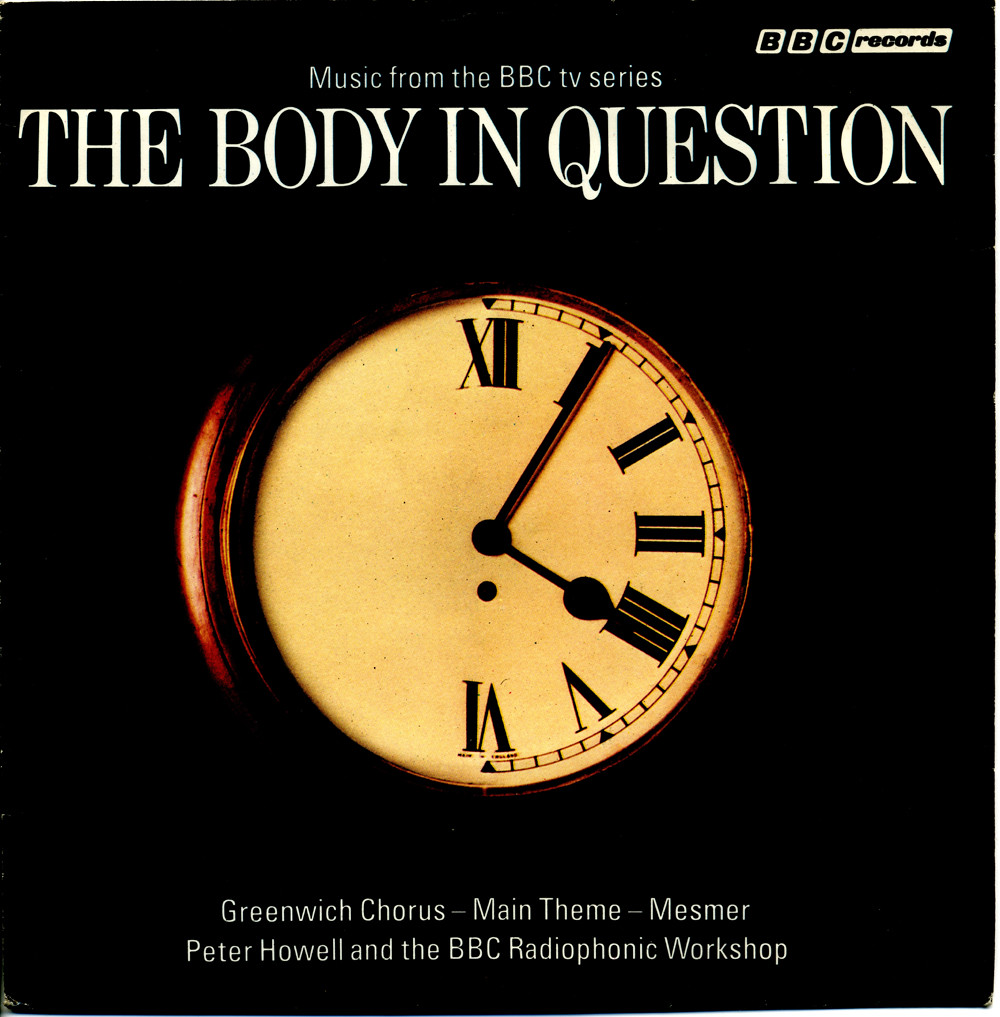
The ’21’ album was an anniversary presentation of the classic, swinging musique concrete sixties and synthesized, multitrack wonders of the seventies at the Workshop.
A Day In The Life of Radio 1
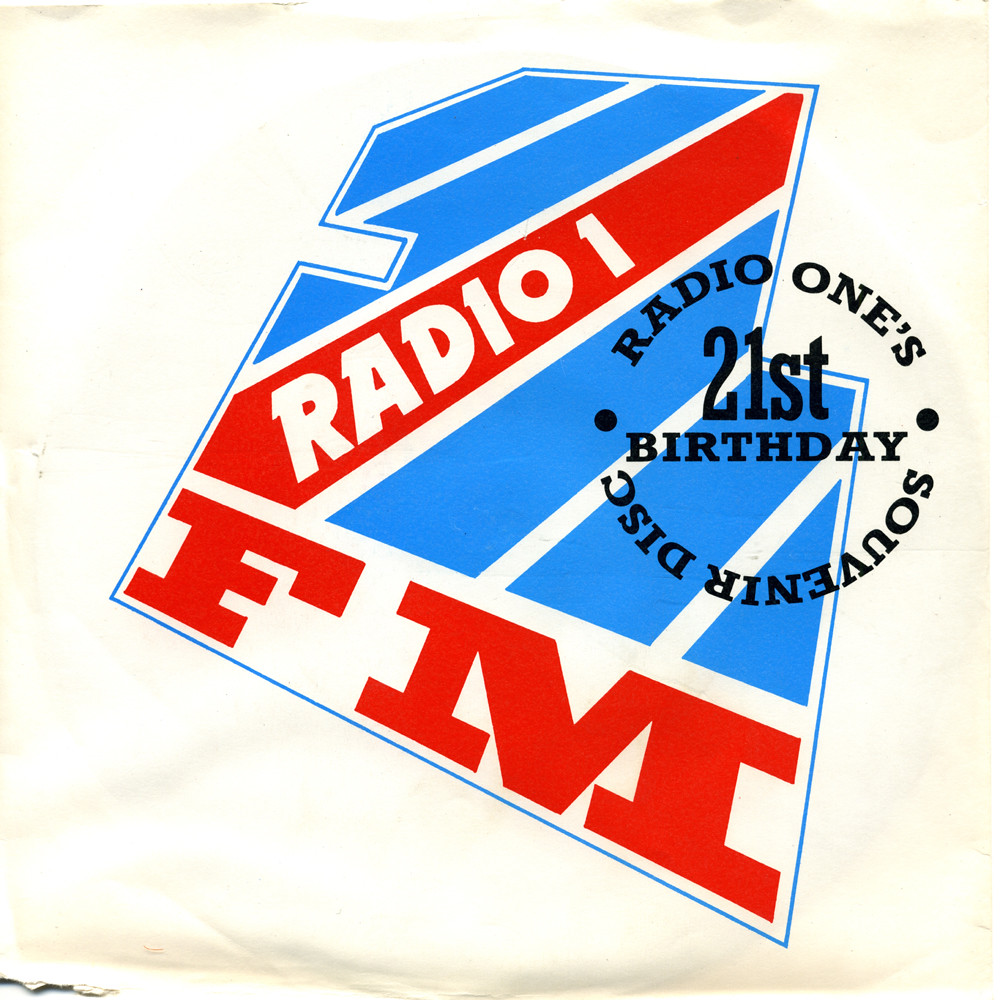
Jimmy Young from Radio One’s 21st Birthday Souvenir Disc – BBCR1 – 1988
The day in question being 15th December 1971. ‘Ones On One’ was a collection of number-one singles released to commemorate the first 25 years of Radio 1. No Nick Berry (loser), but they did include Bucks Fizz. Hmmm. Anyway, inside this double album was tucked a seven inch single with recordings from the nation’s favourite’s first day and this whole day. Jimmy Young is being “irrepressible”.
I Saw The Light

Dave Snell from Dave Snell Plays Hits On A Harp – REC 178 – 1978
An atypical Todd Rundgren hit played atypically on the harp? It happened and Paddy Kingsland, moonlighting from the Radiophonic Workshop, was helping out with some synth lines.
(See how the religious-themed title of this chimes with the previous two spiritual themed Radiophonic Workshop numbers and this also has a RWS link but is a total change of style? Well, I was pleased myself, and now I can share that with you!)
Sing A Soppy Song

Tracey Ullman & David Copperfield as Dollop from – Three of a Kind – REB 480 – 1983
Poor Dollar! But do you know what? When I posted about this record on Twitter, the official Dollar account liked a mention of this send up! And it’s a very good parody of the Trevor Horn produced ‘Give Me Back My Heart’ and hilarious anyway. I’m pretty sure than I remember enjoying this lampooning when I was a kid because I really didn’t like Dollar back then. Now though I can enjoy both versions!
How To Stay Young
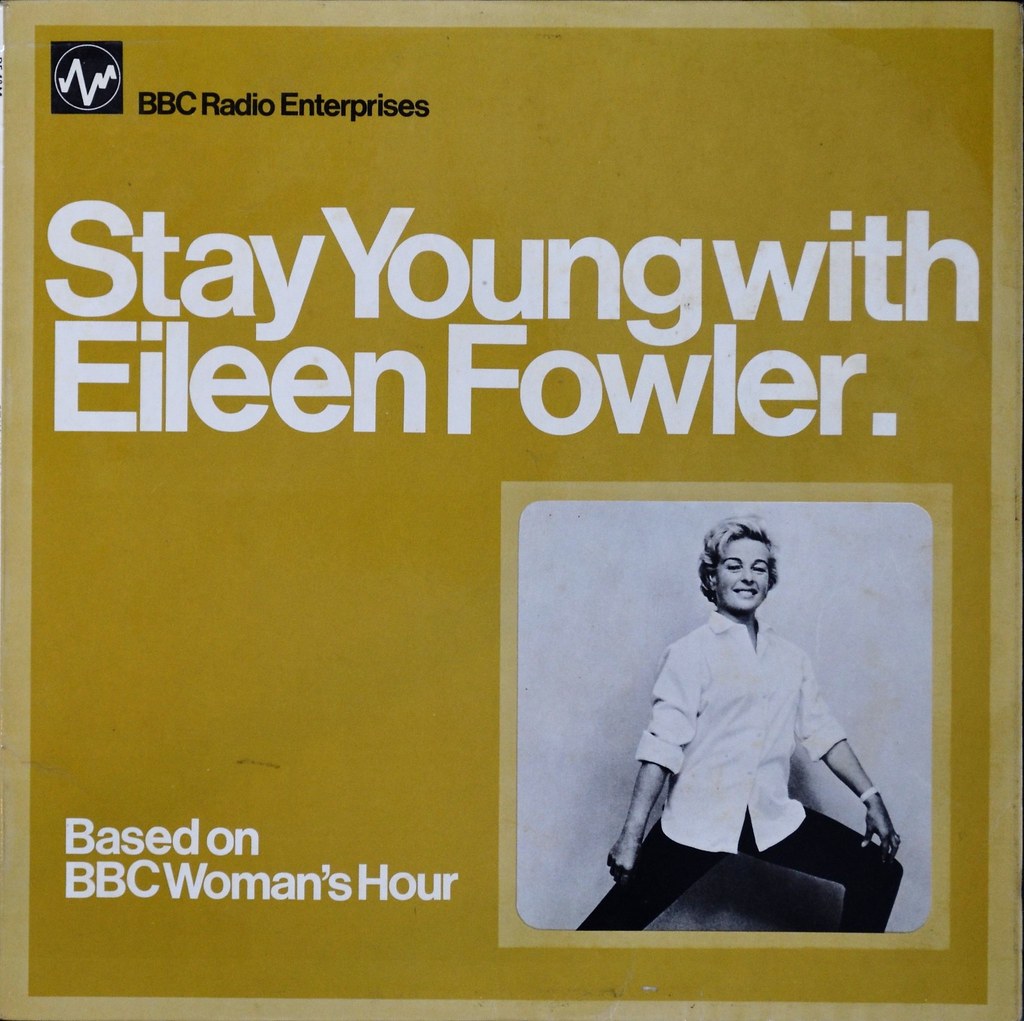
Eileen Fowler from Stay Young with Eileen Fowler – REC 18 – 1968
A mirror in your kitchen. It’s that easy!
Eileen was a one-woman fitness industry in her day and had been with the BBC since 1954. This was her first album for them when the commercial arm was called BBC Radio Enterprises (TV being still just a fad presumably). Another five albums were to follow, making her one of their most bankable stars, with the last one in 1980. I suppose The Green Goddess usurped her, but Diana Moran didn’t endure quite as Eileen had.
For All We Know

The Ray Conniff Orchestra from Ray Moore A Personal Choice – REN 713 – 1989
Warning: Do not ever play ‘The Bog Eyed Jog”. You will have it stuck in your head forever. You have been told. Just don’t.
The Leg Over Into Deep Relaxation
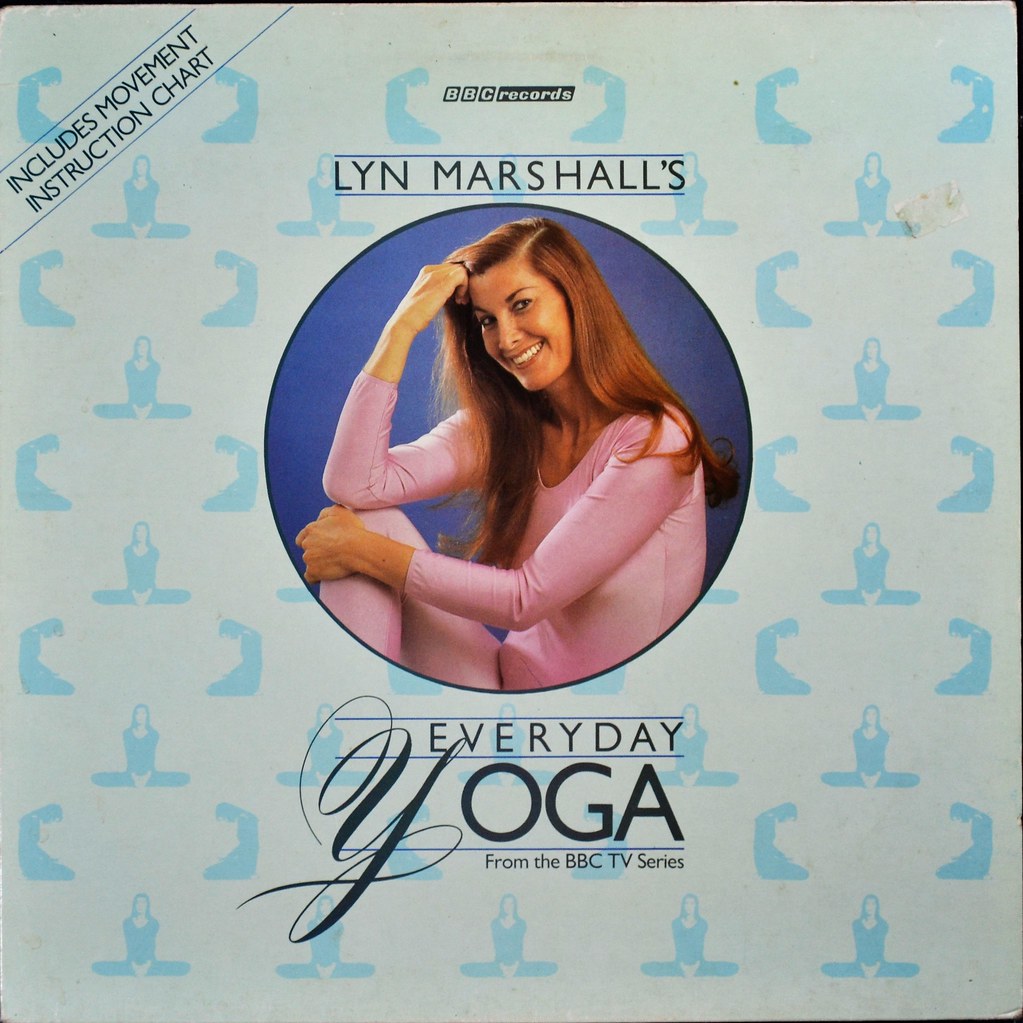
Lyn Marshall from Lyn Marshall’s Everyday Yoga – REH 461 – 1983
